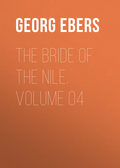
Georg Ebers
Uarda : a Romance of Ancient Egypt. Complete
The sufferer wore nothing but a short petticoat of coarse light-blue stuff. Her face, half resting on the lap of the old woman, was graceful and regular in form, her eyes were half shut-like those of a child, whose soul is wrapped in some sweet dream-but from her finely chiselled lips there escaped from time to time a painful, almost convulsive sob.
An abundance of soft, but disordered reddish fair hair, in which clung a few withered flowers, fell over the lap of the old woman and on to the mat where she lay. Her cheeks were white and rosy-red, and when the young surgeon Nebsecht—who sat by her side, near his blind, stupid companion, the litany-singer—lifted the ragged cloth that had been thrown over her bosom, which had been crushed by the chariot wheel, or when she lifted her slender arm, it was seen that she had the shining fairness of those daughters of the north who not unfrequently came to Thebes among the king’s prisoners of war.
The two physicians sent hither from the House of Seti sat on the left side of the maiden on a little carpet. From time to time one or the other laid his hand over the heart of the sufferer, or listened to her breathing, or opened his case of medicaments, and moistened the compress on her wounded breast with a white ointment.
In a wide circle close to the wall of the room crouched several women, young and old, friends of the paraschites, who from time to time gave expression to their deep sympathy by a piercing cry of lamentation. One of them rose at regular intervals to fill the earthen bowl by the side of the physician with fresh water. As often as the sudden coolness of a fresh compress on her hot bosom startled the sick girl, she opened her eyes, but always soon to close them again for longer interval, and turned them at first in surprise, and then with gentle reverence, towards a particular spot.
These glances had hitherto been unobserved by him to whom they were directed.
Leaning against the wall on the right hand side of the room, dressed in his long, snow-white priest’s robe, Pentaur stood awaiting the princess. His head-dress touched the ceiling, and the narrow streak of light, which fell through the opening in the roof, streamed on his handsome head and his breast, while all around him was veiled in twilight gloom.
Once more the suffering girl looked up, and her glance this time met the eye of the young priest, who immediately raised his hand, and half-mechanically, in a low voice, uttered the words of blessing; and then once more fixed his gaze on the dingy floor, and pursued his own reflections.
Some hours since he had come hither, obedient to the orders of Ameni, to impress on the princess that she had defiled herself by touching a paraschites, and could only be cleansed again by the hand of the priests.
He had crossed the threshold of the paraschites most reluctantly, and the thought that he, of all men, had been selected to censure a deed of the noblest humanity, and to bring her who had done it to judgment, weighed upon him as a calamity.
In his intercourse with his friend Nebsecht, Pentaur had thrown off many fetters, and given place to many thoughts that his master would have held sinful and presumptuous; but at the same time he acknowledged the sanctity of the old institutions, which were upheld by those whom he had learned to regard as the divinely-appointed guardians of the spiritual possessions of God’s people; nor was he wholly free from the pride of caste and the haughtiness which, with prudent intent, were inculcated in the priests. He held the common man, who put forth his strength to win a maintenance for his belongings by honest bodily labor—the merchant—the artizan—the peasant, nay even the warrior, as far beneath the godly brotherhood who strove for only spiritual ends; and most of all he scorned the idler, given up to sensual enjoyments.
He held him unclean who had been branded by the law; and how should it have been otherwise? These people, who at the embalming of the dead opened the body of the deceased, had become despised for their office of mutilating the sacred temple of the soul; but no paraschites chose his calling of his own free will.—[Diodorus I, 91]—It was handed down from father to son, and he who was born a paraschites—so he was taught—had to expiate an old guilt with which his soul had long ago burdened itself in a former existence, within another body, and which had deprived it of absolution in the nether world. It had passed through various animal forms, and now began a new human course in the body of a paraschites, once more to stand after death in the presence of the judges of the under-world.
Pentaur had crossed the threshold of the man he despised with aversion; the man himself, sitting at the feet of the suffering girl, had exclaimed as he saw the priest approaching the hovel:
“Yet another white robe! Does misfortune cleanse the unclean?”
Pentaur had not answered the old man, who on his part took no further notice of him, while he rubbed the girl’s feet by order of the leech; and his hands impelled by tender anxiety untiringly continued the same movement, as the water-wheel in the Nile keeps up without intermission its steady motion in the stream.
“Does misfortune cleanse the unclean?” Pentaur asked himself. “Does it indeed possess a purifying efficacy, and is it possible that the Gods, who gave to fire the power of refining metals and to the winds power to sweep the clouds from the sky, should desire that a man—made in their own image—that a man should be tainted from his birth to his death with an indelible stain?”
He looked at the face of the paraschites, and it seemed to him to resemble that of his father.
This startled him!
And when he noticed how the woman, in whose lap the girl’s head was resting, bent over the injured bosom of the child to catch her breathing, which she feared had come to a stand-still—with the anguish of a dove that is struck down by a hawk—he remembered a moment in his own childhood, when he had lain trembling with fever on his little bed. What then had happened to him, or had gone on around him, he had long forgotten, but one image was deeply imprinted on his soul, that of the face of his mother bending over him in deadly anguish, but who had gazed on her sick boy not more tenderly, or more anxiously, than this despised woman on her suffering child.
“There is only one utterly unselfish, utterly pure and utterly divine love,” said he to himself, “and that is the love of Isis for Horus—the love of a mother for her child. If these people were indeed so foul as to defile every thing they touch, how would this pure, this tender, holy impulse show itself even in them in all its beauty and perfection?”
“Still,” he continued, “the Celestials have implanted maternal love in the breast of the lioness, of the typhonic river-horse of the Nile.”
He looked compassionately at the wife of the paraschites.
He saw her dark face as she turned it away from the sick girl. She had felt her breathe, and a smile of happiness lighted up her old features; she nodded first to the surgeon, and then with a deep sigh of relief to her husband, who, while he did not cease the movement of his left hand, held up his right hand in prayer to heaven, and his wife did the same.
It seemed to Pentaur that he could see the souls of these two, floating above the youthful creature in holy union as they joined their hands; and again he thought of his parents’ house, of the hour when his sweet, only sister died. His mother had thrown herself weeping on the pale form, but his father had stamped his foot and had thrown back his head, sobbing and striking his forehead with his fist.
“How piously submissive and thankful are these unclean ones!” thought Pentaur; and repugnance for the old laws began to take root in his heart. “Maternal love may exist in the hyaena, but to seek and find God pertains only to man, who has a noble aim. Up to the limits of eternity—and God is eternal!—thought is denied to animals; they cannot even smile. Even men cannot smile at first, for only physical life—an animal soul—dwells in them; but soon a share of the world’s soul—beaming intelligence—works within them, and first shows itself in the smile of a child, which is as pure as the light and the truth from which it comes. The child of the paraschites smiles like any other creature born of woman, but how few aged men there are, even among the initiated, who can smile as innocently and brightly as this woman who has grown grey under open ill-treatment.”
Deep sympathy began to fill his heart, and he knelt down by the side of the poor child, raised her arm, and prayed fervently to that One who had created the heavens and who rules the world—to that One, whom the mysteries of faith forbade him to name; and not to the innumerable gods, whom the people worshipped, and who to him were nothing but incarnations of the attributes of the One and only God of the initiated—of whom he was one—who was thus brought down to the comprehension of the laity.
He raised his soul to God in passionate emotion; but he prayed, not for the child before him and for her recovery, but rather for the whole despised race, and for its release from the old ban, for the enlightenment of his own soul, imprisoned in doubts, and for strength to fulfil his hard task with discretion.
The gaze of the sufferer followed him as he took up his former position.
The prayer had refreshed his soul and restored him to cheerfulness of spirit. He began to reflect what conduct he must observe towards the princess.
He had not met Bent-Anat for the first time yesterday; on the contrary, he had frequently seen her in holiday processions, and at the high festivals in the Necropolis, and like all his young companions had admired her proud beauty—admired it as the distant light of the stars, or the evening-glow on the horizon.
Now he must approach this lady with words of reproof.
He pictured to himself the moment when he must advance to meet her, and could not help thinking of his little tutor Chufu, above whom he towered by two heads while he was still a boy, and who used to call up his admonitions to him from below. It was true, he himself was tall and slim, but he felt as if to-day he were to play the part towards Bent-Anat of the much-laughed-at little tutor.
His sense of the comic was touched, and asserted itself at this serious moment, and with such melancholy surroundings. Life is rich in contrasts, and a susceptible and highly-strung human soul would break down like a bridge under the measured tread of soldiers, if it were allowed to let the burden of the heaviest thoughts and strongest feelings work upon it in undisturbed monotony; but just as in music every key-note has its harmonies, so when we cause one chord of our heart to vibrate for long, all sorts of strange notes respond and clang, often those which we least expect.
Pentaur’s glance flew round the one low, over-filled room of the paraschites’ hut, and like a lightning flash the thought, “How will the princess and her train find room here?” flew through his mind.
His fancy was lively, and vividly brought before him how the daughter of the Pharaoh with a crown on her proud head would bustle into the silent chamber, how the chattering courtiers would follow her, and how the women by the walls, the physicians by the side of the sick girl, the sleek white cat from the chest where she sat, would rise and throng round her. There must be frightful confusion. Then he imagined how the smart lords and ladies would keep themselves far from the unclean, hold their slender hands over their mouths and noses, and suggest to the old folks how they ought to behave to the princess who condescended to bless them with her presence. The old woman must lay down the head that rested in her bosom, the paraschites must drop the feet he so anxiously rubbed, on the floor, to rise and kiss the dust before Bent-Anat. Whereupon—the “mind’s eye” of the young priest seemed to see it all—the courtiers fled before him, pushing each other, and all crowded together into a corner, and at last the princess threw a few silver or gold rings into the laps of the father and mother, and perhaps to the girl too, and he seemed to hear the courtiers all cry out: “Hail to the gracious daughter of the Sun!”—to hear the joyful exclamations of the crowd of women—to see the gorgeous apparition leave the hut of the despised people, and then to see, instead of the lovely sick child who still breathed audibly, a silent corpse on the crumpled mat, and in the place of the two tender nurses at her head and feet, two heart-broken, loud-lamenting wretches.
Pentaur’s hot spirit was full of wrath. As soon as the noisy cortege appeared actually in sight he would place himself in the doorway, forbid the princess to enter, and receive her with strong words.
She could hardly come hither out of human kindness.
“She wants variety,” said he to himself, “something new at Court; for there is little going on there now the king tarries with the troops in a distant country; it tickles the vanity of the great to find themselves once in a while in contact with the small, and it is well to have your goodness of heart spoken of by the people. If a little misfortune opportunely happens, it is not worth the trouble to inquire whether the form of our benevolence does more good or mischief to such wretched people.”
He ground his teeth angrily, and thought no more of the defilement which might threaten Bent-Anat from the paraschites, but exclusively, on the contrary, of the impending desecration by the princess of the holy feelings astir in this silent room.
Excited as he was to fanaticism, his condemning lips could not fail to find vigorous and impressive words.
He stood drawn to his full height and drawing his breath deeply, like a spirit of light who holds his weapon raised to annihilate a demon of darkness, and he looked out into the valley to perceive from afar the cry of the runners and the rattle of the wheels of the gay train he expected.
And he saw the doorway darkened by a lowly, bending figure, who, with folded arms, glided into the room and sank down silently by the side of the sick girl. The physicians and the old people moved as if to rise; but she signed to them without opening her lips, and with moist, expressive eyes, to keep their places; she looked long and lovingly in the face of the wounded girl, stroked her white arm, and turning to the old woman softly whispered to her
“How pretty she is!”
The paraschites’ wife nodded assent, and the girl smiled and moved her lips as though she had caught the words and wished to speak.
Bent-Anat took a rose from her hair and laid it on her bosom.
The paraschites, who had not taken his hands from the feet of the sick child, but who had followed every movement of the princess, now whispered, “May Hathor requite thee, who gave thee thy beauty.”
The princess turned to him and said, “Forgive the sorrow, I have caused you.”
The old man stood up, letting the feet of the sick girl fall, and asked in a clear loud voice:
“Art thou Bent-Anat?”
“Yes, I am,” replied the princess, bowing her head low, and in so gentle a voice, that it seemed as though she were ashamed of her proud name.
The eyes of the old man flashed. Then he said softly but decisively:
“Leave my hut then, it will defile thee.”
“Not till you have forgiven me for that which I did unintentionally.”
“Unintentionally! I believe thee,” replied the paraschites. “The hoofs of thy horse became unclean when they trod on this white breast. Look here—” and he lifted the cloth from the girl’s bosom, and showed her the deep red wound, “Look here—here is the first rose you laid on my grandchild’s bosom, and the second—there it goes.”
The paraschites raised his arm to fling the flower through the door of his hut. But Pentaur had approached him, and with a grasp of iron held the old man’s hand.
“Stay,” he cried in an eager tone, moderated however for the sake of the sick girl. “The third rose, which this noble hand has offered you, your sick heart and silly head have not even perceived. And yet you must know it if only from your need, your longing for it. The fair blossom of pure benevolence is laid on your child’s heart, and at your very feet, by this proud princess. Not with gold, but with humility. And whoever the daughter of Rameses approaches as her equal, bows before her, even if he were the first prince in the Land of Egypt. Indeed, the Gods shall not forget this deed of Bent-Anat. And you—forgive, if you desire to be forgiven that guilt, which you bear as an inheritance from your fathers, and for your own sins.”
The paraschites bowed his head at these words, and when he raised it the anger had vanished from his well-cut features. He rubbed his wrist, which had been squeezed by Pentaur’s iron fingers, and said in a tone which betrayed all the bitterness of his feelings:
“Thy hand is hard, Priest, and thy words hit like the strokes of a hammer. This fair lady is good and loving, and I know; that she did not drive her horse intentionally over this poor girl, who is my grandchild and not my daughter. If she were thy wife or the wife of the leech there, or the child of the poor woman yonder, who supports life by collecting the feet and feathers of the fowls that are slaughtered for sacrifice, I would not only forgive her, but console her for having made herself like to me; fate would have made her a murderess without any fault of her own, just as it stamped me as unclean while I was still at my mother’s breast. Aye—I would comfort her; and yet I am not very sensitive. Ye holy three of Thebes!—[The triad of Thebes: Anion, Muth and Chunsu.]—how should I be? Great and small get out of my way that I may not touch them, and every day when I have done what it is my business to do they throw stones at me.
[The paraschites, with an Ethiopian knife, cuts the flesh of the corpse as deeply as the law requires: but instantly takes to flight, while the relatives of the deceased pursue him with stones, and curses, as if they wished to throw the blame on him.]
“The fulfilment of duty—which brings a living to other men, which makes their happiness, and at the same time earns them honor, brings me every day fresh disgrace and painful sores. But I complain to no man, and must forgive—forgive—forgive, till at last all that men do to me seems quite natural and unavoidable, and I take it all like the scorching of the sun in summer, and the dust that the west wind blows into my face. It does not make me happy, but what can I do? I forgive all—”
The voice of the paraschites had softened, and Bent-Anat, who looked down on him with emotion, interrupted him, exclaiming with deep feeling:
“And so you will forgive me?—poor man!”
The old man looked steadily, not at her, but at Pentaur, while he replied: “Poor man! aye, truly, poor man. You have driven me out of the world in which you live, and so I made a world for myself in this hut. I do not belong to you, and if I forget it, you drive me out as an intruder—nay as a wolf, who breaks into your fold; but you belong just as little to me, only when you play the wolf and fall upon me, I must bear it!”
“The princess came to your hut as a suppliant, and with the wish of doing you some good,” said Pentaur.
“May the avenging Gods reckon it to her, when they visit on her the crimes of her father against me! Perhaps it may bring me to prison, but it must come out. Seven sons were mine, and Rameses took them all from me and sent them to death; the child of the youngest, this girl, the light of my eyes, his daughter has brought to her death. Three of my boys the king left to die of thirst by the Tenat,
[Literally the “cutting” which, under Seti I., the father of Rameses, was the first Suez Canal; a representation of it is found on the northern outer wall of the temple of Karnak. It followed nearly the same direction as the Fresh-water canal of Lesseps, and fertilized the land of Goshen.]
which is to join the Nile to the Red Sea, three were killed by the Ethiopians, and the last, the star of my hopes, by this time is eaten by the hyaenas of the north.”
At these words the old woman, in whose lap the head of the girl rested, broke out into a loud cry, in which she was joined by all the other women.
The sufferer started up frightened, and opened her eyes.
“For whom are you wailing?” she asked feebly. “For your poor father,” said the old woman.
The girl smiled like a child who detects some well-meant deceit, and said:
“Was not my father here, with you? He is here, in Thebes, and looked at me, and kissed me, and said that he is bringing home plunder, and that a good time is coming for you. The gold ring that he gave me I was fastening into my dress, when the chariot passed over me. I was just pulling the knots, when all grew black before my eyes, and I saw and heard nothing more. Undo it, grandmother, the ring is for you; I meant to bring it to you. You must buy a beast for sacrifice with it, and wine for grandfather, and eye salve
[The Egyptian mestem, that is stibium or antimony, which was introduced into Egypt by the Asiatics at a very early period and universally used.]
for yourself, and sticks of mastic,
[At the present day the Egyptian women are fond of chewing them, on account of their pleasant taste. The ancient Egyptians used various pills. Receipts for such things are found in the Ebers Papyrus.]
which you have so long lead to do without.”
The paraschites seemed to drink these words from the mouth of his grandchild. Again he lifted his hand in prayer, again Pentaur observed that his glance met that of his wife, and a large, warm tear fell from his old eyes on to his callous hand. Then he sank down, for he thought the sick child was deluded by a dream. But there were the knots in her dress.
With a trembling hand he untied them, and a gold ring rolled out on the floor.
Bent-Anat picked it up, and gave it to the paraschites. “I came here in a lucky hour,” she said, “for you have recovered your son and your child will live.”
“She will live,” repeated the surgeon, who had remained a silent witness of all that had occurred.
“She will stay with us,” murmured the old man, and then said, as he approached the princess on his knees, and looked up at her beseechingly with tearful eyes:
“Pardon me as I pardon thee; and if a pious wish may not turn to a curse from the lips of the unclean, let me bless thee.”
“I thank you,” said Bent-Anat, towards whom the old man raised his hand in blessing.
Then she turned to Nebsecht, and ordered him to take anxious care of the sick girl; she bent over her, kissed her forehead, laid her gold bracelet by her side, and signing to Pentaur left the hut with him.







